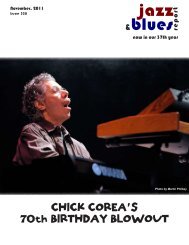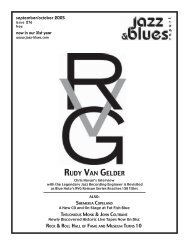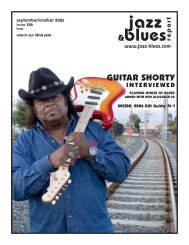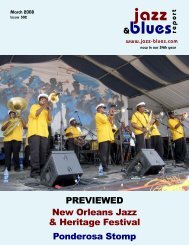&blues - the Jazz & Blues Report
&blues - the Jazz & Blues Report
&blues - the Jazz & Blues Report
- TAGS
- jazz
- blues
- jazz-blues.com
You also want an ePaper? Increase the reach of your titles
YUMPU automatically turns print PDFs into web optimized ePapers that Google loves.
technique here also has <strong>the</strong> bonus of Cole’s strong<br />
playing.<br />
The trio is heard on <strong>the</strong> only Holman original, “Bill.”<br />
This performance, inspired by Bill Evans, has a flamenco<br />
tinge. Ano<strong>the</strong>r trio performance, Herbie Hancock’s<br />
“Cantaloupe Island,” closes this CD. “Explosion”! is a<br />
solid debut for Jim Holman and suggests that he is a<br />
voice we will be hearing more from.<br />
Ron Weinstock<br />
THe cooKerS<br />
cast The first Stone<br />
PLUS Loin<br />
Taking <strong>the</strong>ir name from a series of classic Blue Note<br />
live recordings, The Cookers is an ensemble built upon<br />
some of <strong>the</strong> strongest jazz musicians of <strong>the</strong> past halfcentury<br />
or so. With <strong>the</strong> tenor saxophone of Billy Harper<br />
and trumpet of Eddie Henderson <strong>the</strong>y are supported<br />
by a rhythm section of pianist George Cables, bassist<br />
Cecil McBee and drummer Billy Hart. These five have<br />
graced clubs, stages and recording studios with <strong>the</strong><br />
LiTTLe G WeeViL<br />
likes of Dexter Gordon, Max Roach, Lee Morgan, Herbie<br />
The Teaser<br />
Hancock, Art Blakey and countess o<strong>the</strong>rs, with each<br />
APic recorDS<br />
also establishing a formidable legacy of <strong>the</strong>ir own.<br />
Little G. Weevil is a guitarist and storyteller. This More recently <strong>the</strong>y have been joined by younger<br />
12 cut disc features ample doses of both. Turning his players in <strong>the</strong>ir tradition: trumpeter Dan Weiss and alto<br />
attention to everything from <strong>the</strong> indignity of working saxophonist Craig Handy. Weiss in fact has become <strong>the</strong><br />
around <strong>the</strong> clock for a lousy wage, 8.47, to <strong>the</strong> satisfac- band’s straw boss and produced <strong>the</strong> group’s latest disc,<br />
tion of a good drink, Liquor Store, Weevil follows <strong>the</strong> “Cast <strong>the</strong> First Stone” (Plus Loin Music). Saxophonist<br />
long tradition of <strong>the</strong> <strong>blues</strong> and turns tales that most of Azar Lawrence guests on several tracks on this. The<br />
us have lived into some pretty compelling songs. compositions are originals from Harper, McBee and<br />
Apple Picker is a Muddy Waters style boast regard- Cables with one exception.<br />
ing his way with <strong>the</strong> ladies and features Weevil’s adept The title track is a Harper original built around a<br />
guitar riffing over a slow shuffle laid down by <strong>the</strong> band. punchy four note figure that sports tempo changes in<br />
On She Used to Call Me Sugar he crafts a tale of love its melody and displays <strong>the</strong> band’s fiery approach that<br />
that has found its way into <strong>the</strong> rearview mirror, a point may suggest some of <strong>the</strong> recordings by Woody Shaw<br />
made all <strong>the</strong> more clear by <strong>the</strong> rib stabs he lays down and o<strong>the</strong>rs from <strong>the</strong> seventies and eighties, with <strong>the</strong><br />
with his guitar.<br />
energetic ensembles and surging solos from Harper,<br />
As bad as losing a lover can be, Weevil finds <strong>the</strong> Weiss and Cables. The latter mixes in a more melodic<br />
real <strong>blues</strong> when his ex moves in with his parents on segment as McBee buzzes around him and Hart mixes<br />
Losing Cool. Big City Life finds him suffocating in <strong>the</strong> in adept use of accents on his cymbals, before Harper<br />
hustle and bustle of daily city life so he uses his guitar takes <strong>the</strong> lead with some fiery playing. The nature<br />
to blast free with some energetic riffing.<br />
of <strong>the</strong> composition gives <strong>the</strong> performance a rougher<br />
Fueled by boogie guitar grooves and harmonica, feel. McBee’s “Peacemaker” has a lighter, more supple<br />
compliments of Maurice Nazzaro, on Highway 78 he tone with Henderson taking <strong>the</strong> initial solo employing<br />
exults in <strong>the</strong> freedom of <strong>the</strong> road as he travels between a mute. He is followed by a lengthy solo from Craig<br />
Birmingham and Memphis On Back Porch he lays his Handy and <strong>the</strong>n McBee, as Cables and Hart softly play<br />
electric aside in favor of a 1940 Kay Archtop and la- under him.<br />
ments blasting free with a bit too much gusto at <strong>the</strong> Cables’ “Looking For Light” has an elegance to<br />
club <strong>the</strong> night before.<br />
it. Guest Azar Lawrence adds some alluring soprano,<br />
Real Men Don’t Dance is an energetic number with soloing along with Henderson (again using a mute)<br />
lots of harmonica and boogie piano driving <strong>the</strong> tale of and Cables reinforcing <strong>the</strong> spirit of <strong>the</strong> performance.<br />
nature’s mating ritual.<br />
Harper’s “The Seventh Day” has a more forceful cast,<br />
While this disc travels a well trod road, Little G. followed by <strong>the</strong> uplifting “Croquet Ballet.” Harper, Weiss<br />
Weevil is a fine companion on <strong>the</strong> trip with stories that and Cables solo on both numbers while <strong>the</strong> latter tune<br />
make <strong>the</strong> time fly by. Mark Smith also includes a solo from Handy. After Cables’ “Think of<br />
May • June 2012 • Issue 342<br />
Pa g e Tw e n T y







